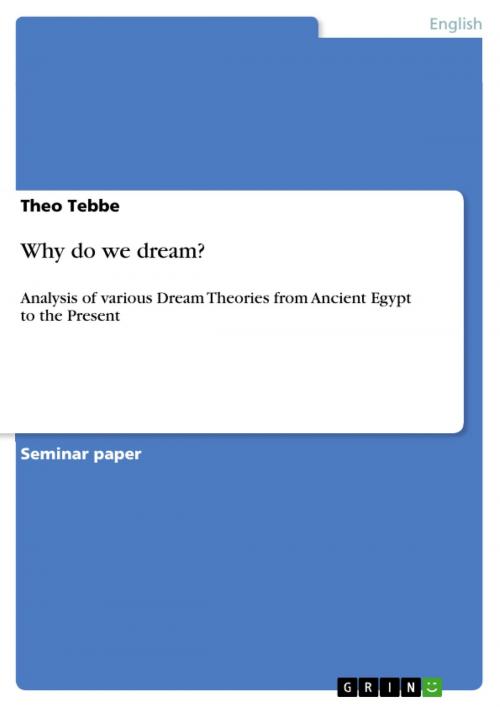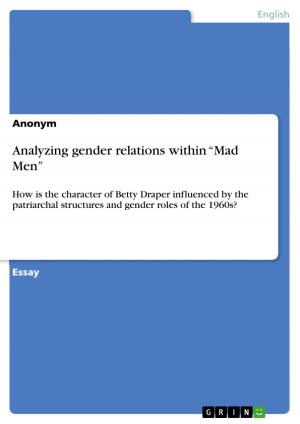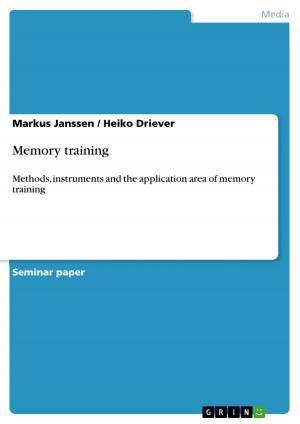Why do we dream?
Analysis of various Dream Theories from Ancient Egypt to the Present
Nonfiction, Entertainment, Drama, Anthologies| Author: | Theo Tebbe | ISBN: | 9783640635221 |
| Publisher: | GRIN Publishing | Publication: | June 1, 2010 |
| Imprint: | GRIN Publishing | Language: | English |
| Author: | Theo Tebbe |
| ISBN: | 9783640635221 |
| Publisher: | GRIN Publishing |
| Publication: | June 1, 2010 |
| Imprint: | GRIN Publishing |
| Language: | English |
Seminar paper from the year 2010 in the subject English Language and Literature Studies - Other, grade: 1,7, University of Osnabrück, course: Forging the American Mind - Literature, Philosophy and the Anticipation of Cognitive Science, language: English, abstract: Dreams can be seen as subjective phenomena that only become realities if we can remember their contents after waking. But how many of you remember your dreams and why do we dream at all? - The first question can easily be answered: About 80% according to the statistics (Jouvet 27). The answer to the second question, however, has puzzled humankind for a long time and even today scientists do not agree on one explicit theory. In my term paper I will present various answers to the question of dreaming given by different dream analysts. At first, I will give a short historical overview on the role of dreams and how they have been seen in different societies. Whereas the Ancient Egypt and the bible attributed a supernatural element to dreams, Aristotle introduced the psychological character of dreams. The main work of my paper will be the analysis of three major perspectives on dream theories: The psychoanalytical, the biological, and the cognitive perspective. Freud argued that dreams express unconscious desires and underlying wishes which he termed the latent content. In contrast, Hobson & McCarley believe that dreams are created because of random activity in the brain during a certain state of sleep (REM). More recent studies done by Stickgold try to be more precise. He argues that the brain is active during sleep because it tries to identify new connections to learn new things from old memory. In a final step, I will apply the different dream theories on a dream from the movie 'Requiem for a Dream' (USA, 2000) in order to outline and compare their main features and to show what a dream can tell us about the personality and the life of the dreamer according to the three perspectives.
Seminar paper from the year 2010 in the subject English Language and Literature Studies - Other, grade: 1,7, University of Osnabrück, course: Forging the American Mind - Literature, Philosophy and the Anticipation of Cognitive Science, language: English, abstract: Dreams can be seen as subjective phenomena that only become realities if we can remember their contents after waking. But how many of you remember your dreams and why do we dream at all? - The first question can easily be answered: About 80% according to the statistics (Jouvet 27). The answer to the second question, however, has puzzled humankind for a long time and even today scientists do not agree on one explicit theory. In my term paper I will present various answers to the question of dreaming given by different dream analysts. At first, I will give a short historical overview on the role of dreams and how they have been seen in different societies. Whereas the Ancient Egypt and the bible attributed a supernatural element to dreams, Aristotle introduced the psychological character of dreams. The main work of my paper will be the analysis of three major perspectives on dream theories: The psychoanalytical, the biological, and the cognitive perspective. Freud argued that dreams express unconscious desires and underlying wishes which he termed the latent content. In contrast, Hobson & McCarley believe that dreams are created because of random activity in the brain during a certain state of sleep (REM). More recent studies done by Stickgold try to be more precise. He argues that the brain is active during sleep because it tries to identify new connections to learn new things from old memory. In a final step, I will apply the different dream theories on a dream from the movie 'Requiem for a Dream' (USA, 2000) in order to outline and compare their main features and to show what a dream can tell us about the personality and the life of the dreamer according to the three perspectives.















